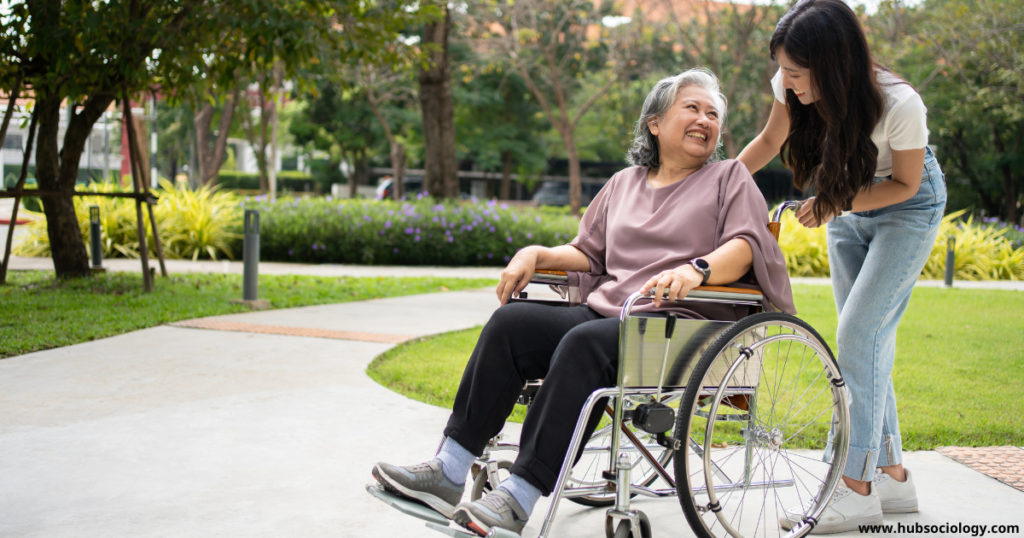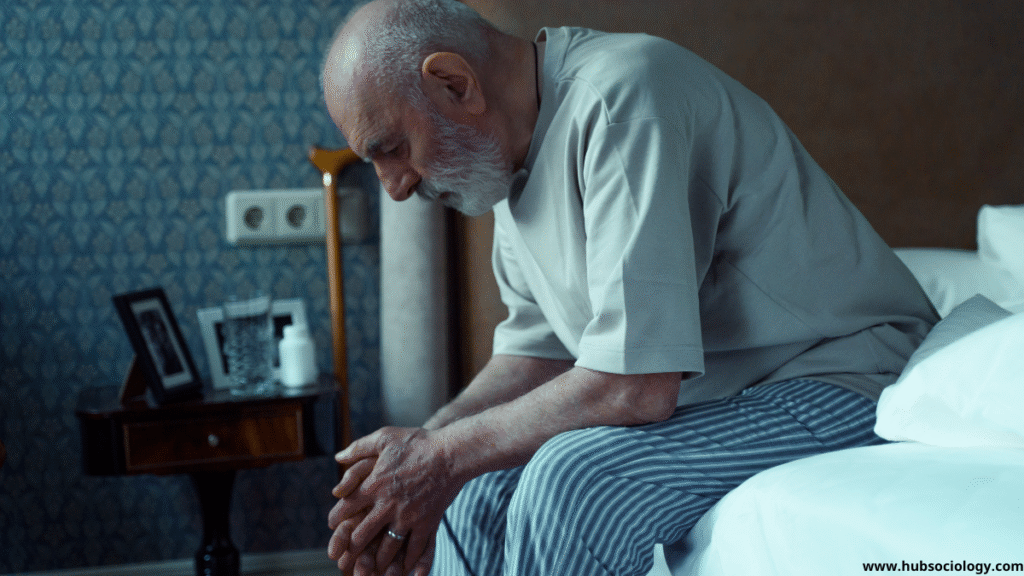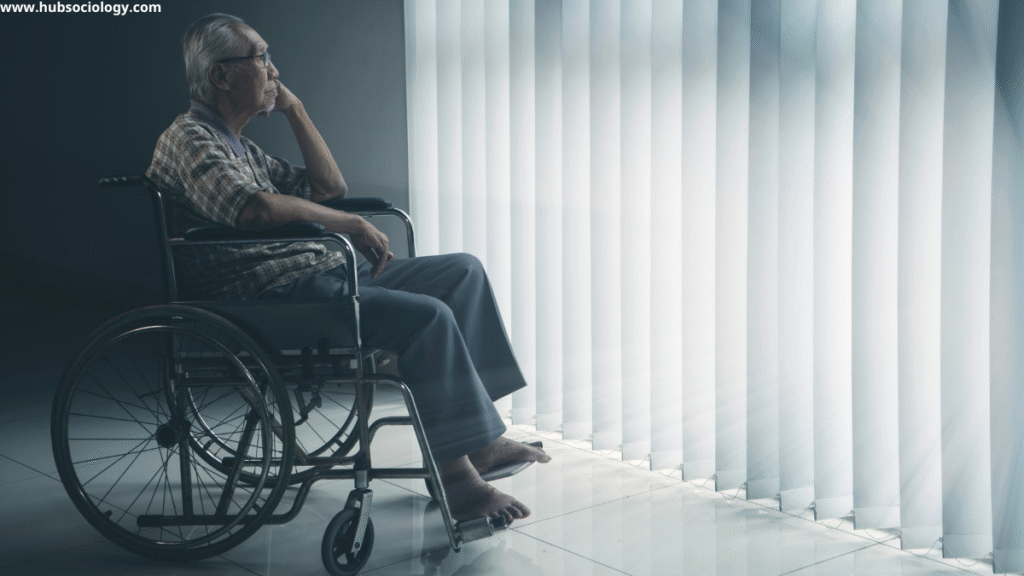Introduction on Health Problems of Elderly People
The aging population is a growing demographic worldwide, leading to increased attention on the health problems faced by elderly individuals. From a sociological perspective, the health issues of older adults are not merely biological but are deeply intertwined with social structures, cultural norms, economic conditions, and policy frameworks. Aging is a complex process influenced by factors such as social support, healthcare accessibility, economic stability, and societal attitudes toward the elderly.
This article explores the health problems of elderly people through a sociological lens, examining how social determinants contribute to physical and mental health challenges. It also discusses the role of family, community, and government in addressing these issues.

Table of Contents
1. The Sociology of Aging and Health
Aging is a natural biological process, but its impact on health is shaped by social conditions. Sociologists study aging through various theoretical perspectives, including:
- Structural Functionalism: Views aging as a process where individuals transition into new social roles (e.g., retirement). Health problems arise when society fails to integrate the elderly effectively.
- Conflict Theory: Argues that elderly individuals face health disparities due to economic inequality and lack of access to healthcare.
- Symbolic Interactionism: Focuses on how societal perceptions of aging influence self-identity and mental health among the elderly.
These perspectives highlight how social structures and interactions shape the health experiences of older adults.
2. Common Health Problems Among the Elderly
Elderly individuals face a range of health issues, many of which are exacerbated by social factors:
A. Chronic Diseases
- Cardiovascular Diseases (CVDs): Hypertension, heart attacks, and strokes are prevalent due to lifestyle factors and limited healthcare access.
- Diabetes: Often linked to poor diet, lack of exercise, and socioeconomic barriers to healthy living.
- Arthritis and Osteoporosis: Mobility issues lead to dependency, affecting mental health and social participation.
B. Mental Health Issues
- Depression and Anxiety: Social isolation, loss of loved ones, and financial insecurity contribute to high rates of depression.
- Dementia and Alzheimer’s Disease: Cognitive decline leads to stigma and marginalization, increasing caregiver burden.

C. Sensory and Functional Impairments
- Vision and Hearing Loss: Reduces social interaction, leading to loneliness.
- Mobility Issues: Lack of infrastructure (e.g., ramps, public transport) restricts independence.
3. Social Determinants of Health Problems of Elderly People
Sociological research emphasizes that health in old age is not just a medical issue but is shaped by broader social factors:
A. Economic Inequality
- Poverty limits access to nutritious food, medication, and healthcare services.
- Many elderly rely on pensions or family support, which may be insufficient.
B. Healthcare Accessibility
- Rural elderly face difficulties due to a lack of medical facilities.
- High treatment costs force many to forgo necessary care.
C. Social Isolation and Loneliness
- Retirement, death of peers, and family neglect lead to isolation.
- Societies with weak community support systems see higher rates of elderly depression.
D. Ageism and Discrimination
- Negative stereotypes about aging lead to exclusion from employment and social activities.
- Healthcare providers may undertreat elderly patients due to age bias.
E. Changing Family Structures
- Nuclear families and migration reduce traditional caregiving support.
- Elderly in institutional care often face neglect and abuse.
4. The Role of Society in Addressing Elderly Health Issues
To mitigate health problems among the elderly, sociological interventions are necessary:
A. Strengthening Social Support Systems
- Community programs (e.g., senior clubs, day-care centers) can reduce isolation.
- Intergenerational activities foster social inclusion.
B. Policy Interventions
- Governments must expand pension schemes and healthcare subsidies.
- Laws against elder abuse and age discrimination should be enforced.
C. Improving Healthcare Infrastructure
- Geriatric care units and mobile health clinics can enhance accessibility.
- Training healthcare workers in elderly-specific needs is crucial.
D. Promoting Active Aging
- Encouraging physical activity, lifelong learning, and volunteer work improves well-being.
- Public awareness campaigns can combat ageist attitudes.
5. Conclusion on Health Problems of Elderly People
The health problems of elderly people are deeply rooted in social structures. While biological aging is inevitable, societal conditions determine the quality of life in old age. Economic stability, healthcare access, social support, and anti-discrimination policies play a crucial role in ensuring healthy aging. A sociological approach highlights the need for systemic changes to create an inclusive society where the elderly can live with dignity and good health.

By addressing these social determinants, we can build a future where aging is not synonymous with suffering but with continued participation and well-being.
Do you like this this Article ? You Can follow as on :-
Facebook – https://www.facebook.com/hubsociology
Whatsapp Channel – https://whatsapp.com/channel/0029Vb6D8vGKWEKpJpu5QP0O
Gmail – hubsociology@gmail.com
Topic Related Questions on Health Problems of Elderly People
5-Mark Questions on Health Problems of Elderly People (Short Answer)
- Define aging from a sociological perspective.
- List three common chronic diseases among the elderly.
- How does social isolation affect the mental health of elderly people?
- What is ageism, and how does it impact elderly health?
- Name two government policies that can improve elderly healthcare.
- How does economic inequality contribute to health problems in old age?
- What role do family structures play in elderly health?
- Explain one way community programs can help the elderly.
- What are the mental health challenges faced by the elderly?
- How does retirement influence an elderly person’s social life?
10-Mark Questions on Health Problems of Elderly People (Brief Essay-Type)
- Discuss the sociological theories of aging and their relevance to elderly health problems.
- Explain how social determinants like poverty and healthcare access affect elderly health.
- Analyze the impact of changing family structures on elderly care in modern society.
- How does ageism contribute to the marginalization of elderly people in healthcare?
- Evaluate the role of community support systems in improving elderly mental health.
- Discuss the challenges faced by rural elderly populations in accessing healthcare.
- How can government policies reduce health disparities among the elderly?
- Examine the relationship between loneliness and physical health in old age.
- What are the effects of retirement on an elderly person’s psychological well-being?
- Suggest measures to promote active aging in society.
15-Mark Questions on Health Problems of Elderly People (Long Essay-Type)
- Critically analyze the health problems of elderly people from a sociological perspective, highlighting key social determinants.
- Discuss the role of family, community, and state in addressing the healthcare needs of the elderly.
- How does economic inequality shape the health experiences of elderly individuals? Provide solutions.
- Examine the impact of ageism and social exclusion on the mental and physical health of the elderly.
- Evaluate the effectiveness of existing social welfare policies for elderly healthcare in your country.
- “Aging is not just a biological process but a social construct.” Discuss this statement with reference to elderly health issues.
- How can societies promote healthy aging through structural and cultural changes?
- Discuss the challenges faced by elderly individuals in urban vs. rural settings regarding healthcare access.
- Analyze the psychological and social consequences of chronic illnesses among the elderly.
- Suggest policy recommendations to improve the quality of life for elderly populations.

1 thought on “Health Problems of Elderly People: A Sociological Perspective”